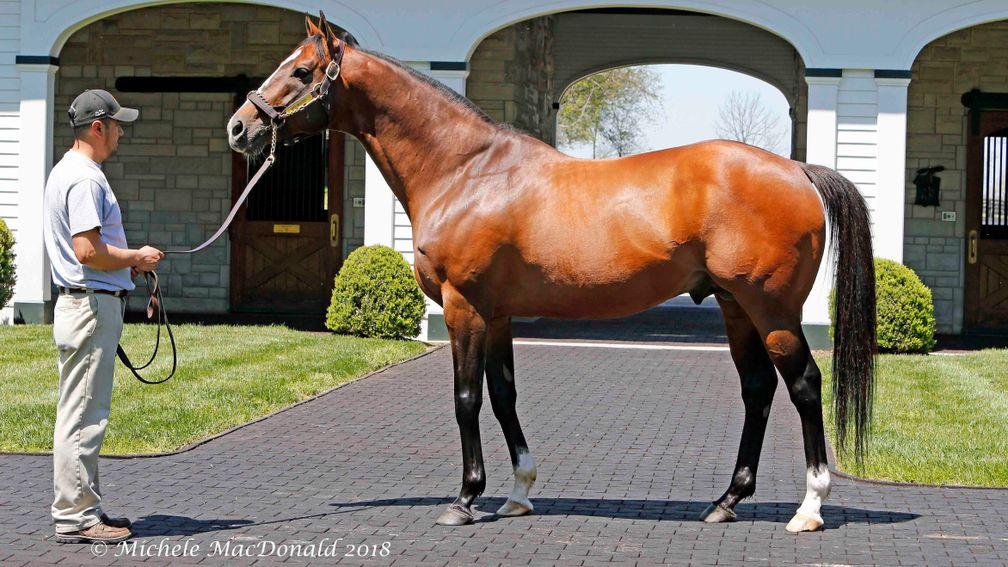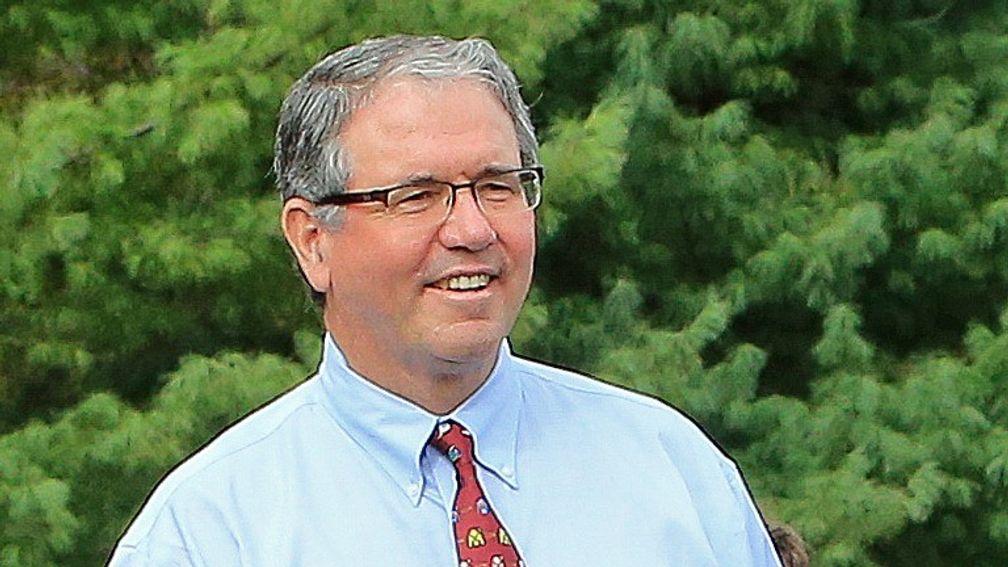Early opinions mixed on American Jockey Club proposal to limit book size
Possible restriction of stallions to 140 mares has divided breeders

Many stud farm owners and managers reserved comment following an announcement Friday by the American Jockey Club stating it will consider limiting stallion book size to 140 mares. The reaction of those willing to offer an early opinion was mixed about the potential ramifications of such a change.
The Jockey Club board of stewards is requesting feedback on the proposal that would cap the number of mares beginning with the 2021 breeding season. The board is considering this action because of concern about narrowing diversity of the Thoroughbred gene pool due to an escalation in the number of stallions breeding 140 mares or more each year.
According to The Jockey Club, 37 North American stallions in 2007 bred books in excess of 140 mares out of a total of 3,865 stallions. By 2010, that number had declined to 24. Since then, the number has nearly doubled to 43 sires out of a stallion population that is less than half the size of the population in 2007.
On the mare side in 2007, according to The Jockey Club, 5,894 mares [9.5 per cent of all mares bred] were bred by stallions that covered more than 140 mares. By 2019, 7,415 mares [27 per cent of all mares bred] were covered by stallions with books of more than 140, a threefold increase.
In 2018, 39 US stallions had books exceeding 140 mares, with five covering books in excess of 200 mares - Into Mischief, Cupid, Klimt, Practical Joke and Violence. The average book size for these 39 stallions was 170 mares.
"The combination of these changes has resulted in a substantial increase in the percentage of foals produced by a discreet segment of stallions - signalling a worrisome concentration of the gene pool," stated The Jockey Club, which noted that as the keeper of the American Stud Book, it maintains its principal rules and requirements in order to ensure the welfare of the Thoroughbred.
"My impression is that this is a very good thing because the book sizes have gotten completely out of control," said Bill Farish of Lane's End near Versailles, Kentucky, which stood six stallions that bred in excess of 140 mares in 2018.
"Fundamentally, the numbers tell the story. With the number of stallions being down as much as it is and the average book size as high as it is, it is a recipe for disaster for the gene pool."

"That would be beneficial to new stallions not being given a chance right now and to second and third [crop] stallions, if you had that limit," he said.
Though Lane's End has had stallions with bigger books, Farish said he wouldn't hesitate to limit all his stallions to 140 mares.
"The good ones tend to make it at all levels, whether they are getting 80 mares or 160 mares," he said. "The law of supply and demand will take over, and the stallions in high demand will command a higher stud fee. This is going to help the commercial breeders as well. It is really helping everyone."
Ned Toffey, the general manager of Spendthrift Farm, where current leading North American sire Into Mischief stands, was not supportive of the proposed cap. The Lexington-area farm owned by B. Wayne Hughes stood 26 stallions in Kentucky during the 2019 breeding season, which included four stallions that bred 165 mares or more in 2018.
"We are disappointed that The Jockey Club would float this idea without anyone having approached us and asked our opinion," Toffey said. "We obviously breed larger books. If you were to reduce Into Mischief's book, his becomes a very expensive stud fee, and the way it is now works for a lot of smaller breeders."
If the root concern for this change is about protecting the gene pool, Toffey said he wished the evidence backing up that concern had been disseminated along with this proposal.
"If you limit the book on one son of Harlan's Holiday and then send the mares to another because you stand two, have you really saved the gene pool?" Toffey asked. "We would like to see the data. I think there is no question that there is an economic factor here. Is it about the gene pool or about competition?
"As a significant player in the stallion market, it would have been nice if this had been brought to us. It has never been discussed with us," he added.
Duncan Taylor, president of Taylor Made Farm, said he supported the phased-in approach to be fair to farms that have already bought new stallions but said he couldn't commit 100 per cent to the proposal without seeing the details. He added there is always concern about unanticipated consequences.

"I actually think the bigger books wiped out the [Keeneland] July sale because you might have only four or five of the best by a stallion that had only 60 foals, so people had to come. Then it changed with Giant's Causeway. Once you had 150, then people knew they could go to September where there would be 70 and pick out one of those."
Taylor Made also owns shares in a couple of Standardbred stallions, and Taylor noted that though this industry allows artificial insemination, book sizes have been limited to 140 mares in the US. These same restrictions, however, do not apply in other countries where frozen semen could be shipped from the US, providing another economic avenue not available with Thoroughbreds.
"Right now, I'm not for it or against it," Taylor said of The Jockey Club's proposal. "This needs to be thought through, and I am concerned about messing with the market. I'm more for natural market forces."
The Jockey Club is inviting comments on the proposed rule from breeders, owners, and anyone with interests in the Thoroughbred industry. They are invited to contact The Jockey Club online at jockeyclub.com.
For more news on US racing, sales and bloodstock news visit bloodhorse.com
Published on 7 September 2019inNews
Last updated 09:49, 7 September 2019
- Shortlisted nominees announced for the tenth TBA National Hunt Breeders’ Awards
- Racing Post Foal Gallery: May
- Blackbeard's sister and €2.6 million Goffs graduate Run Away makes successful debut at Yarmouth
- Station Yard back on track for Guineas Breeze-Up Sale after dream Craven result
- 'A unique insight into this fascinating world' - Tweenhills hosts Hartpury students on Racing to School visit
- Shortlisted nominees announced for the tenth TBA National Hunt Breeders’ Awards
- Racing Post Foal Gallery: May
- Blackbeard's sister and €2.6 million Goffs graduate Run Away makes successful debut at Yarmouth
- Station Yard back on track for Guineas Breeze-Up Sale after dream Craven result
- 'A unique insight into this fascinating world' - Tweenhills hosts Hartpury students on Racing to School visit